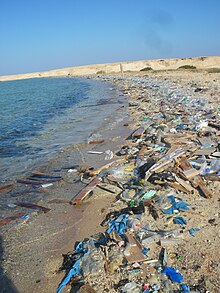Our website is made possible by displaying online advertisements to our visitors.
Please consider supporting us by disabling your ad blocker.
Marine debris

| Part of a series on |
| Pollution |
|---|
 |
Marine debris, also known as marine litter, is human-created solid material that has deliberately or accidentally been released in seas or the ocean. Floating oceanic debris tends to accumulate at the center of gyres and on coastlines, frequently washing aground, when it is known as beach litter or tidewrack. Deliberate disposal of wastes at sea is called ocean dumping. Naturally occurring debris, such as driftwood and drift seeds, are also present. With the increasing use of plastic, human influence has become an issue as many types of (petrochemical) plastics do not biodegrade quickly, as would natural or organic materials.[1] The largest single type of plastic pollution (~10%) and majority of large plastic in the oceans is discarded and lost nets from the fishing industry.[2] Waterborne plastic poses a serious threat to fish, seabirds, marine reptiles, and marine mammals, as well as to boats and coasts.[3]
Dumping, container spillages, litter washed into storm drains and waterways and wind-blown landfill waste all contribute to this problem. This increased water pollution has caused serious negative effects such as discarded fishing nets capturing animals, concentration of plastic debris in massive marine garbage patches, and increasing concentrations of contaminants in the food chain.
In efforts to prevent and mediate marine debris and pollutants, laws and policies have been adopted internationally, with the UN including reduced marine pollution in Sustainable Development Goal 14 "Life Below Water". Depending on relevance to the issues and various levels of contribution, some countries have introduced more specified protection policies. Moreover, some non-profits, NGOs, and government organizations are developing programs to collect and remove plastics from the ocean. However, in 2017 the UN estimated that by 2050 there will be more plastic than fish in the oceans if substantial measures are not taken.[4]
- ^ Graham, Rachel (10 July 2019). "Euronews Living | Watch: Italy's answer to the problem with plastic". living.
- ^ "Dumped fishing gear is biggest plastic polluter in ocean, finds report". The Guardian. 6 November 2019. Retrieved 9 April 2021.
- ^ "Facts about marine debris". US NOAA. Archived from the original on 13 February 2009. Retrieved 10 April 2008.
- ^ "FEATURE: UN's mission to keep plastics out of oceans and marine life". UN News. 27 April 2017. Retrieved 8 December 2020.
Previous Page Next Page


